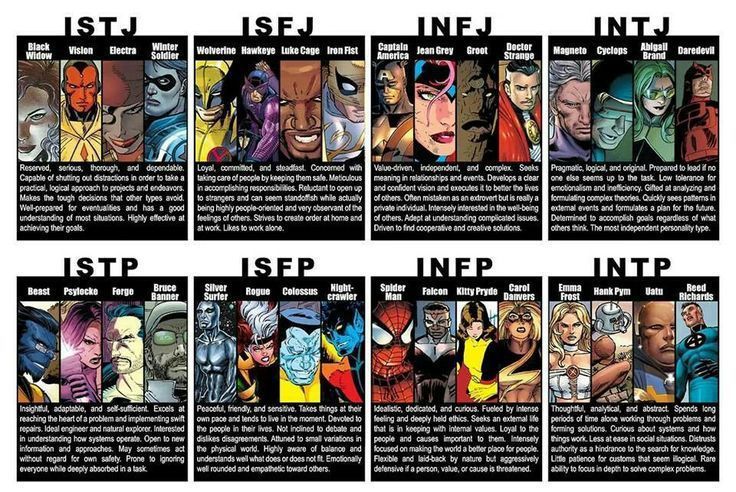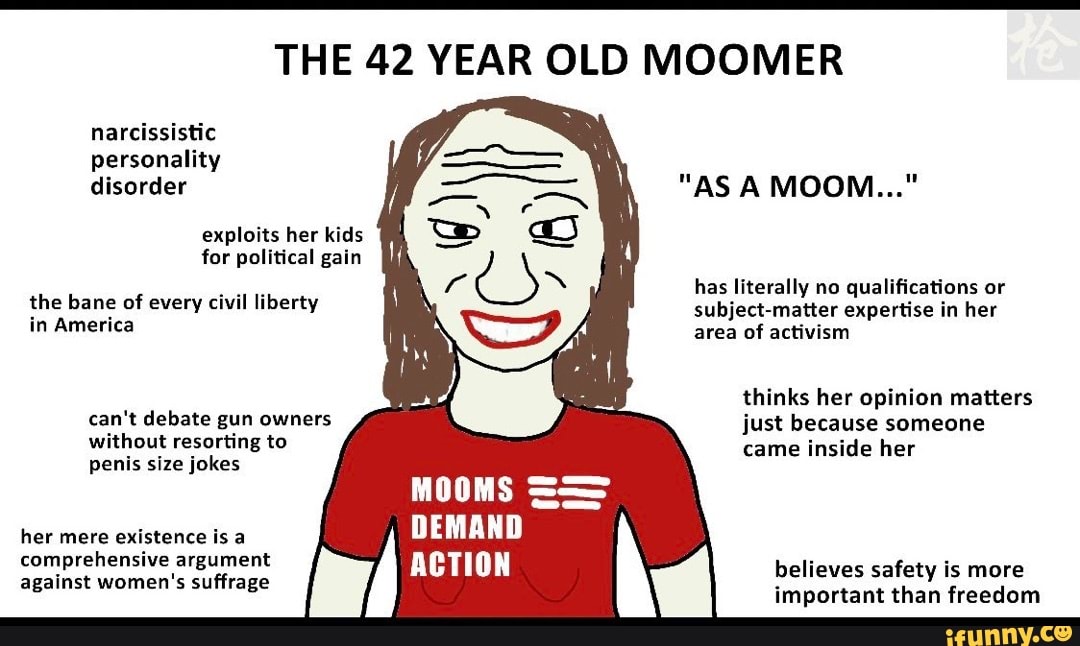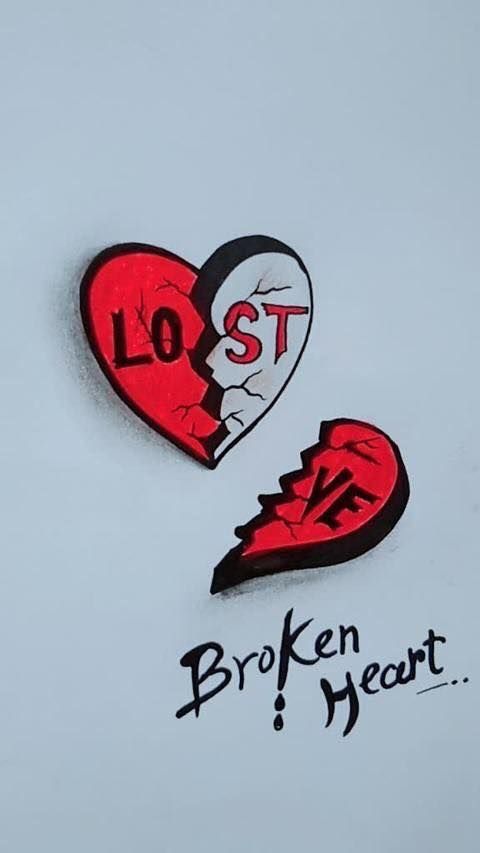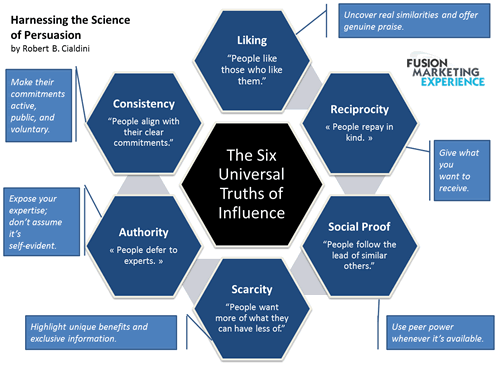Borderline behavior in relationships
How to Make It Work
People with borderline personality disorder (BPD) often have rocky relationships, both romantic and platonic. Romantic relationships present a unique set of challenges for people with BPD and for their partners.
Symptoms of BPD can cause constant changes in emotions.
For example, a person with BPD may be affectionate and doting, but within a few hours, their emotional state may switch. They may feel smothered or overwhelmed. This can lead them to push away the partner they had just been drawing closer.
With treatment and continual support from family and partners, people with BPD can have successful relationships. Read on to find out how it’s possible and what you can do if you or your partner has BPD.
Borderline personality disorder (BPD) is a condition that affects the way a person processes everyday emotions and reactions.
People with BPD are often impulsive and emotionally unstable. They may have intense episodes of anger, anxiety, and depression. These episodes can last several hours and be followed by a more stable period.
These episodes could also last several days and negatively affect the person’s work, relationships, or physical health. Some people with BPD are prone to self-injury, accidents, and fights. Suicide is also more common among people with BPD.
Another way to understand how a person with BPD experiences life is to realize they have a more difficult time returning to an emotional baseline.
When something exciting or positive happens, they may experience greater joy for longer. But the opposite is also true: If something bad happens, they may have trouble bouncing back.
For friends, family members, and potential partners of someone with BPD, these emotional peaks and valleys may seem chaotic, which can lead to intense, conflict-filled relationships.
A romantic relationship with someone with BPD can be, in a word, stormy. It’s not uncommon to experience a great deal of turmoil and dysfunction.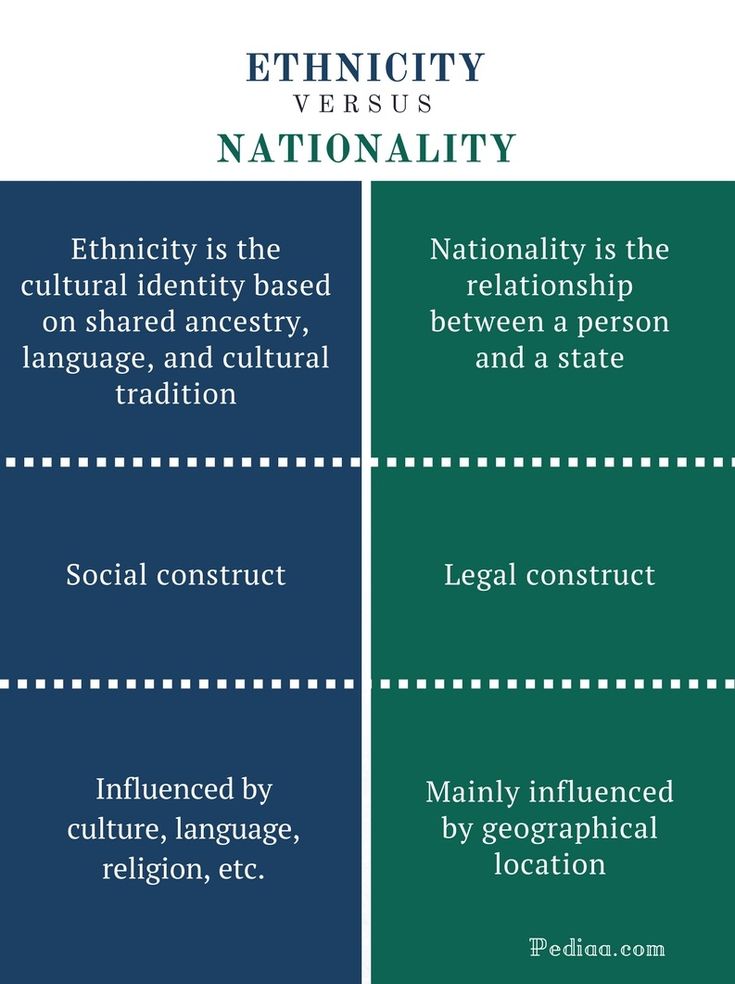
However, people with BPD can be exceptionally caring, compassionate, and affectionate. In fact, some people find this level of devotion from a partner pleasant. A person with BPD may also be very physical and eager to spend a lot of time with their partner.
At the same time, people with BPD are sensitive to abandonment or rejection. Many are hyperfocused on perceived signs that a romantic partner isn’t happy or may leave them.
When a person with BPD senses a shift in their partner’s feelings, whether real or imagined, they may immediately withdraw. They can become angry and hurt over something a person without BPD would not react to. They can even become obsessive.
These emotional switchbacks can be difficult to handle. Sometimes they can lead to uncomfortable public scenes. The impulsive behavior of a person with BPD may put that person or their partner at risk, too.
However, the stability of a partner may have a positive effect on the emotional sensitivities people with BPD experience.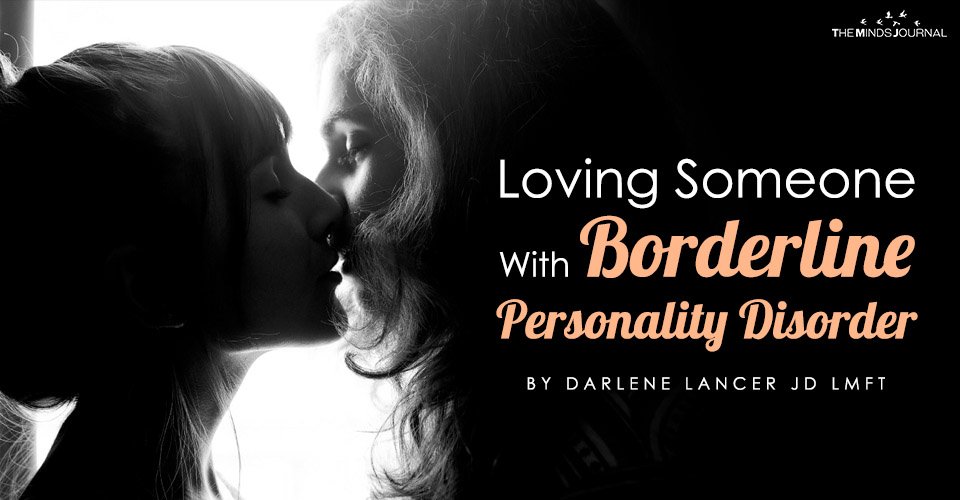 It may require a great deal of work from both partners, but long-term relationships and marriages are possible for people with BPD.
It may require a great deal of work from both partners, but long-term relationships and marriages are possible for people with BPD.
The most common BPD behaviors and symptoms could be detrimental to any relationship. If you have been diagnosed with the condition, you likely know this already. People with BPD are more likely to have many romantic relationships, which are often short-lived.
This could be because you purposefully broke off the relationship for fear your partner might do it first. It could also be because your partner wasn’t comfortable facing so much difficulty.
It’s important to know that you can have a healthy relationship despite your personality disorder. Treatment, along with a strong support network, can help you find stability in your emotional state and in your relationships.
Treatment won’t cure BPD, but these options can help you learn to cope with the symptoms and react in ways that aren’t as harmful to you or your partner.
treatment for bpdThe most common treatments for BPD include:
- Therapy.
Dialectical behavioral therapy is commonly used with people who have BPD. A therapist will help you learn to respond to emotional situations with reason and proper judgment. This will reduce the dichotomous thinking (the belief that everything is black and white) that so many people with BPD have.
- Medication. There is no medication that can treat BPD, but antidepressants, antianxiety drugs, and antipsychotics may help treat some of the symptoms.
- Hospitalization. If you begin showing signs of self-harm or suicidal ideation, a doctor may hospitalize you for observation and intensive therapy.
If you or your partner has BPD, you can find ways to cope with the cycles of emotions that the condition causes. This can help you build a stronger, more resilient connection.
ways to improve bpd relationships
- Learn about BPD. Part of caring for a partner with BPD is understanding what they’re experiencing.
Understanding the level of emotional disorder they experience can help you respond in a way that protects both of you from additional chaos.
- Seek professional help. Therapy can help people with BPD learn to better process emotions and events that upset them. Partners of people with BPD can also benefit from therapy. A professional can help a partner understand how to react, understand, and be supportive.
- Offer emotional support. Someone with BPD may feel very isolated because of their past. Offer your partner understanding and patience. It is possible for them to learn and have better behaviors.
People with BPD are good and compassionate, and they can have healthy relationships. It takes work, and lifelong challenges will remain.
Therapists and doctors can work with you or your partner to develop a treatment plan. These healthcare providers can help you address the BPD symptoms that are most damaging to you and to your relationship.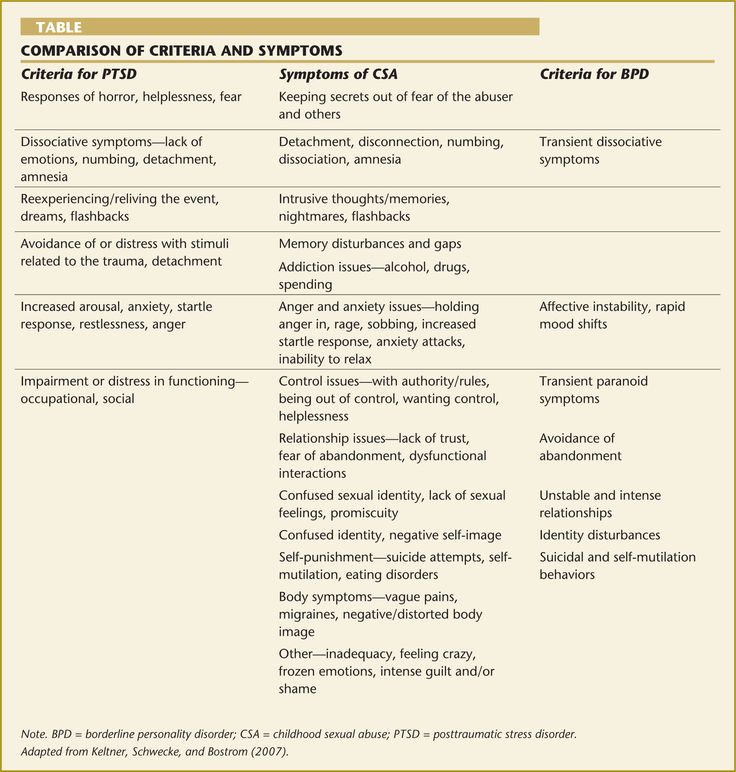
7 Things People with Borderline Personality Disorder Want You to Know
Borderline personality disorder is often misunderstood. It’s time to change that.
Borderline personality disorder — sometimes known as emotionally unstable personality disorder — is a personality disorder which affects how you think and feel about yourself and others.
People with borderline personality disorder (BPD) often have a strong fear of abandonment, struggle to maintain healthy relationships, have very intense emotions, act impulsively, and may even experience paranoia and dissociation.
It can be a scary illness to live with, which is why it’s so important that people with BPD are surrounded by people who can understand and support them. But it’s also an incredibly stigmatized illness.
Due to an abundant of misconceptions around it, many people with the disorder feel scared to speak out about living with it.
But we want to change that.
That’s why I reached out and asked people with BPD to tell us what they want other people to know about living with the condition.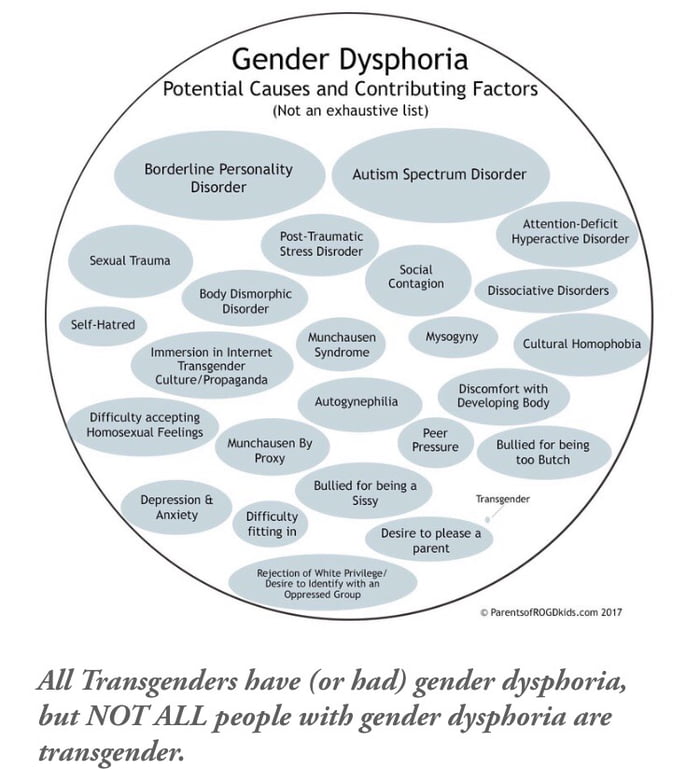 Here are seven of their powerful responses.
Here are seven of their powerful responses.
1. ‘We’re scared you’re going to leave, even when things are good. And we hate it too.’
One of the biggest symptoms of BPD is fear of abandonment and this can occur even when things in the relationship seem to be going well.
There’s this pervasive fear that people will leave us, or that we aren’t good enough for that person — and even if it seems irrational to others, it can feel very real to the person who’s struggling.
Someone with BPD would do anything to stop that from happening, which is why they may come across as being “clingy” or “needy.” Though it can be difficult to empathize with, remember that it stems from a place of fear, which can be incredibly hard to live with.
2. ‘It feels like going through life with third-degree emotional burns; everything is hot and painful to touch.’
This person says it exactly right — people with BPD have very intense emotions that can last from a few hours to even a few days, and can change very quickly.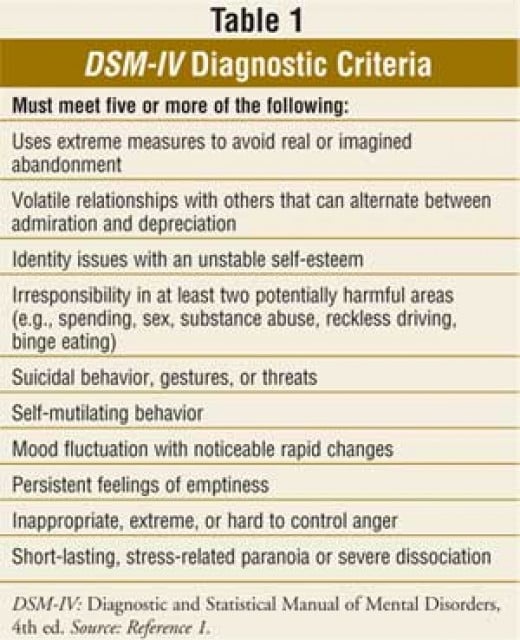
For example, we can go from feeling very happy to suddenly feeling very low and sad. Sometimes having BPD is like walking on eggshells around yourself — we never know which way our mood is going to go, and sometimes it’s hard to control.
Even if we seem “overly-sensitive,” remember that it’s not always within our control.
3. ‘Everything is felt more intensely: good, bad, or otherwise. Our reaction to such feelings may seem out of proportion, but it’s appropriate in our minds.’
Having BPD can be very intense, as though we’re vacillating between extremes. This can be exhausting for both us and for the people around us.
But it’s important to remember that everything the person with BPD is thinking is more than appropriate in their mind at that time. So please don’t tell us we’re being silly or make us feel as though our feelings aren’t valid.
It may take them time to reflect on our thoughts — but in the moment things can feel scary as hell. This means not judging and giving space and time where it’s warranted.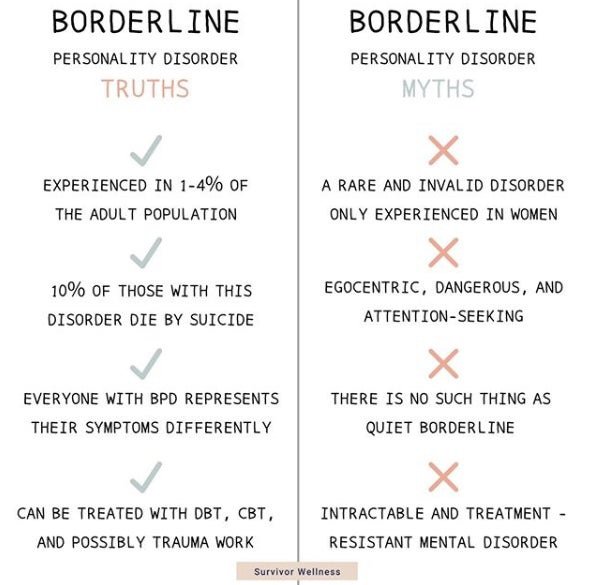
4. ‘I don’t have multiple personalities.’
Due to it being a personality disorder, BPD is often confused with someone having dissociative identity disorder, where people develop multiple personalities.
But this isn’t the case at all. People with BPD don’t have more than one personality. BPD is a personality disorder in which you have difficulties with how you think and feel about yourself and other people, and are having problems in your life as a result of this.
That doesn’t mean that dissociative identity disorder should be stigmatized, either, but it certainly shouldn’t be confused with another disorder.
5. ‘We aren’t dangerous or manipulative… [we] just need a little bit of extra love.’
There’s still a huge stigma surrounding BPD. Many people still believe that those living with it can be manipulative or dangerous due to their symptoms.
While this can be the case in a very small minority of people, most people with BPD are just struggling with their sense of self and their relationships.
It’s important to note that we’re not dangerous people. In fact, people with mental illness are more likely to harm themselves than they are others.
6. ‘It’s exhausting and frustrating. And it’s really hard to find quality, affordable treatment.’
Many people with BPD are untreated, but not because they’re unwilling. It’s because this mental illness isn’t treated like many others.
For one, BPD isn’t treated with medication. It can only be treated with therapy, such as dialectical behavioral therapy (DBT) and cognitive behavioral therapy (CBT). There are no drugs known to be effective for treating BPD (though sometimes medications are used off-label to relieve symptoms).
It’s also true that due to stigma, some clinicians assume people with BPD will be difficult patients, and as such, it can be difficult to find effective treatment.
Many people with BPD can benefit from intensive DBT programs, but these aren’t the easiest to access. Which is to say, if someone with BPD isn’t “getting better,” don’t be quick to blame them — getting help is hard enough on its own.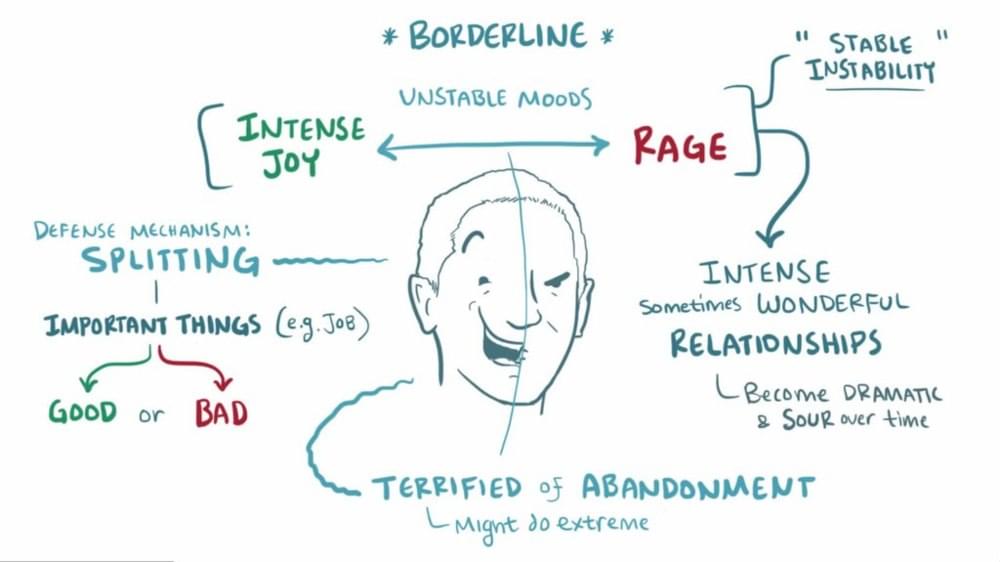
7. ‘We aren’t unlovable and we love big.’
People with BPD have a lot of love to give, so much that it can be overwhelming.
Relationships can feel like a whirlwind at times, because when someone with BPD — especially those grappling with chronic feelings of emptiness or loneliness — makes a real connection, the rush can be just as intense as any other emotion they experience.
This can make being in a relationship with someone with BPD difficult, but it also means that this is a person that has so much love to offer. They just want to know that their feelings are returned, and may need a little more reassurance to ensure that the relationship is still fulfilling for you both.
If you’re in a relationship or have a loved one with BPD, it’s important to do your research into the condition, and be wary of the stereotypes you may come across
Chances are, if you read something about borderline personality disorder that you wouldn’t want said about you, a person with BPD won’t benefit from having that assumed about them, either.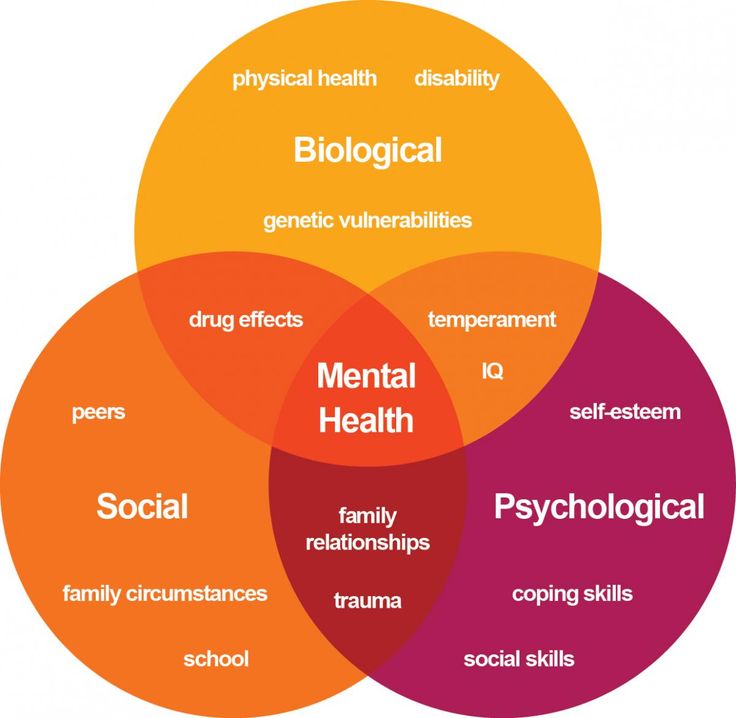
Working to gain a compassionate understanding of what they’re going through, and how you can help both your loved one and yourself cope, can make or break a relationship.
If you feel like you need some extra support, open up to someone about how you’re feeling — bonus points if it’s a therapist or clinician! — so they can offer you some support and tips on how to improve your own mental well-being.
Remember, the best support for your loved one comes from taking the best possible care of you.
Share on Pinterest
Hattie Gladwell is a mental health journalist, author, and advocate. She writes about mental illness in hopes of diminishing the stigma and to encourage others to speak out.
How to live with borderline personality disorder
Daria Batyrshina
lives with BPD
Author profile
I couldn't get a correct diagnosis for several years, and then it completely changed my life.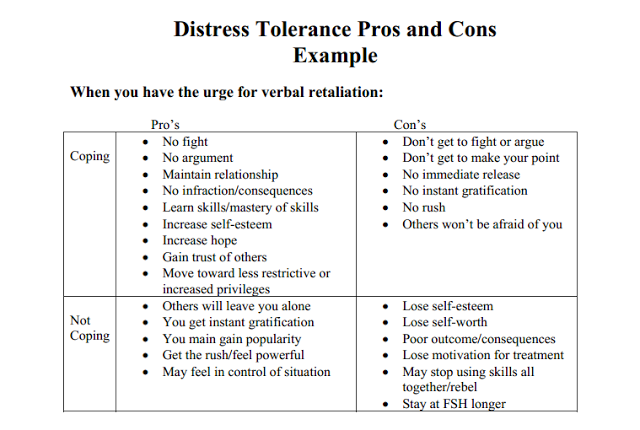
To describe borderline personality disorder, or BPD, the well-known saying of psychologist Marsha Linehan is perfect: “These people simply don't have 'emotional skin'. Even the slightest touch or movement can cause the most severe suffering.” nine0003
Share my path to getting the correct diagnosis, symptoms, and tips for dealing with people with BPD.
Go see a doctor
Our articles are written with love for evidence-based medicine. We refer to authoritative sources and go to doctors with a good reputation for comments. But remember: the responsibility for your health lies with you and your doctor. We don't write prescriptions, we make recommendations. Relying on our point of view or not is up to you. nine0003
What is borderline personality disorder
Borderline personality disorder is characterized by permanent changes in mood, self-image and behavior. This can lead to problems in relationships with other people and impulsive actions of all kinds.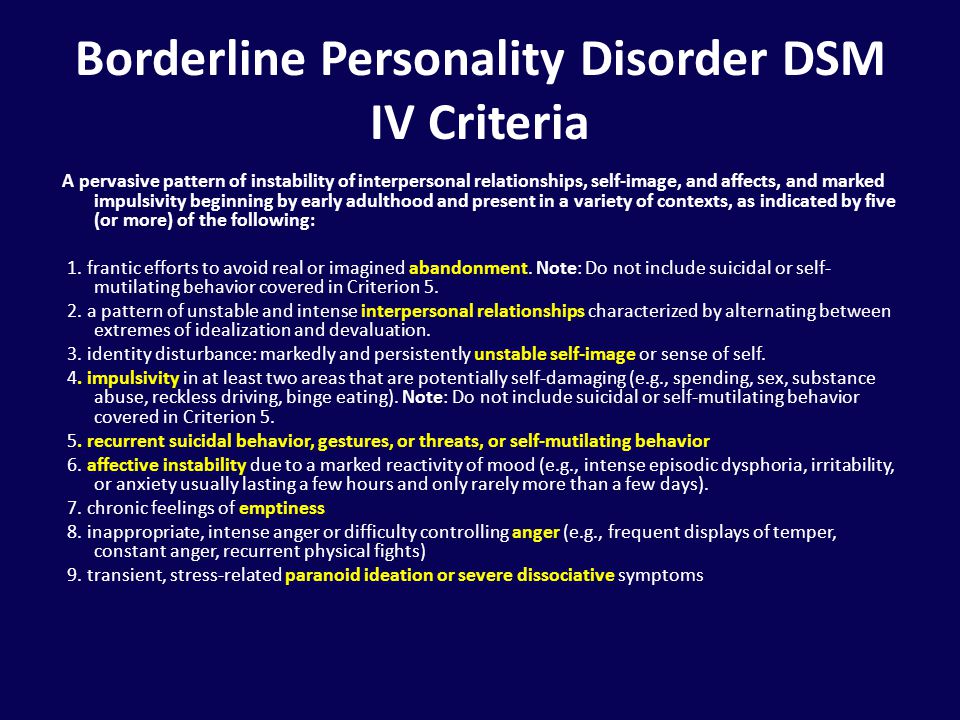
BPD - Mayo Clinic
BPD - National Institute of Mental Health, USA
In the International Classification of Diseases 10th Revision, or ICD-10, there is in fact no diagnosis of "borderline personality disorder", there is an emotionally unstable personality disorder, which two types: borderline and impulsive. In ICD-11, this is already a separate diagnosis, which is called borderline personality disorder. nine0003
The disorder has several main features.
So what? 01/12/22
Transition to the new International Classification of Diseases has begun in Russia: what will change and when
Self-injurious and risky behavior. For example, a person may injure themselves or use psychoactive substances - borderline disorder increases the risk of developing various addictions.
Black and white thinking: it seems to a person that there can only be good and bad, there are no halftones.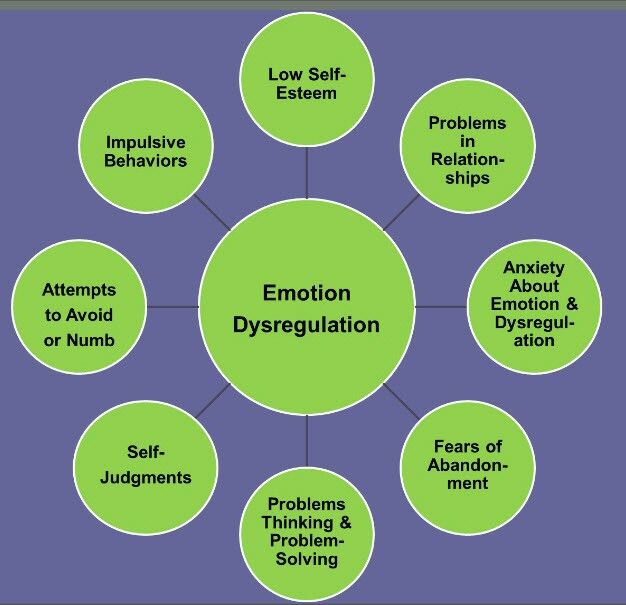 nine0003
nine0003
Criteria for diagnosing BPD - Medscape
Problems with self-esteem. People with this disorder are overly sensitive to the opinions of others, enter into dependent relationships, have a strong fear of being alone, and may take desperate actions to keep a loved one or get their attention.
The manifestations of borderline personality disorder are similar to those of adolescence: outbursts of anger, mood swings, aloofness, so this diagnosis is made after 18 years. nine0003
What are the symptoms of borderline personality disorder
Alexey Pribytkov
psychotherapist, psychiatrist, Ph.D. It happened.

Why borderline personality disorder develops
Why borderline personality disorder develops is not exactly known.
NHS
Biological factors.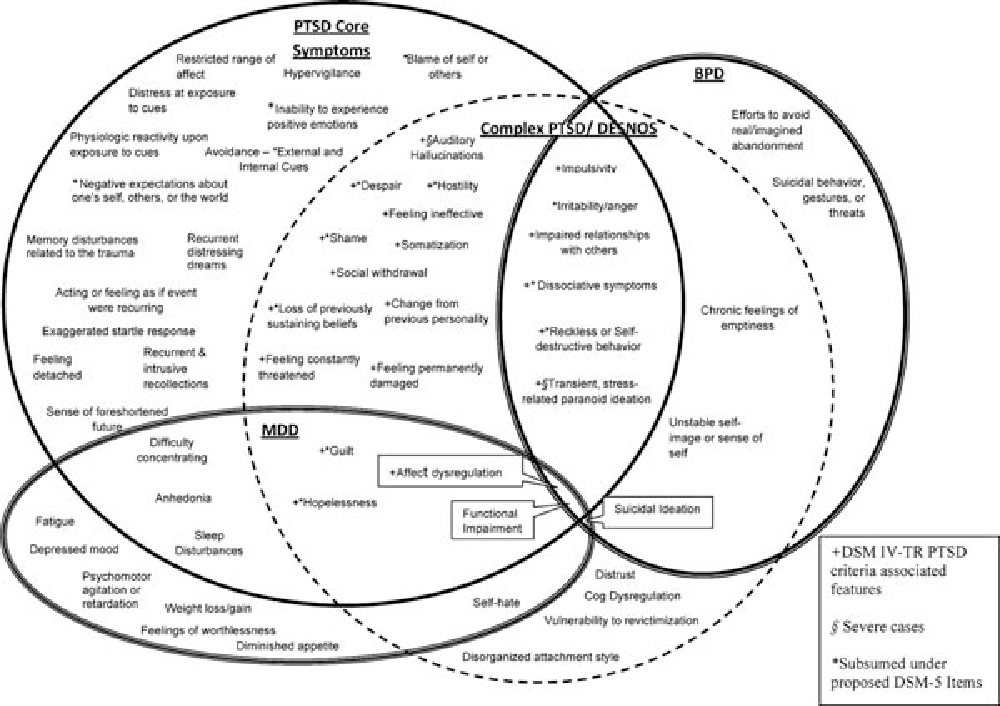 There is evidence that the development of personality disorders, including BPD, may depend on genetic factors. nine0003
There is evidence that the development of personality disorders, including BPD, may depend on genetic factors. nine0003
BPD may also be associated with changes in some parts of the brain responsible for controlling emotions. Its development can be affected by disturbances in the functioning of the system of neurotransmitters - compounds with the help of which brain neurons communicate with each other, in particular serotonin.
Social factors. For example, unstable relationships with significant adults, lack of love in childhood, neglect by parents, loss of a loved one.
Emotional or physical abuse, as well as intense fear experienced in childhood, greatly increase the risk of any psychological problems. In this case, BPD can be combined with another diagnosis - post-traumatic stress disorder, or PTSD. It is manifested by constant frightening memories of a traumatic event and increased anxiety. The more unstable the environment around and the more traumatized the child, the more likely it is to get PTSD.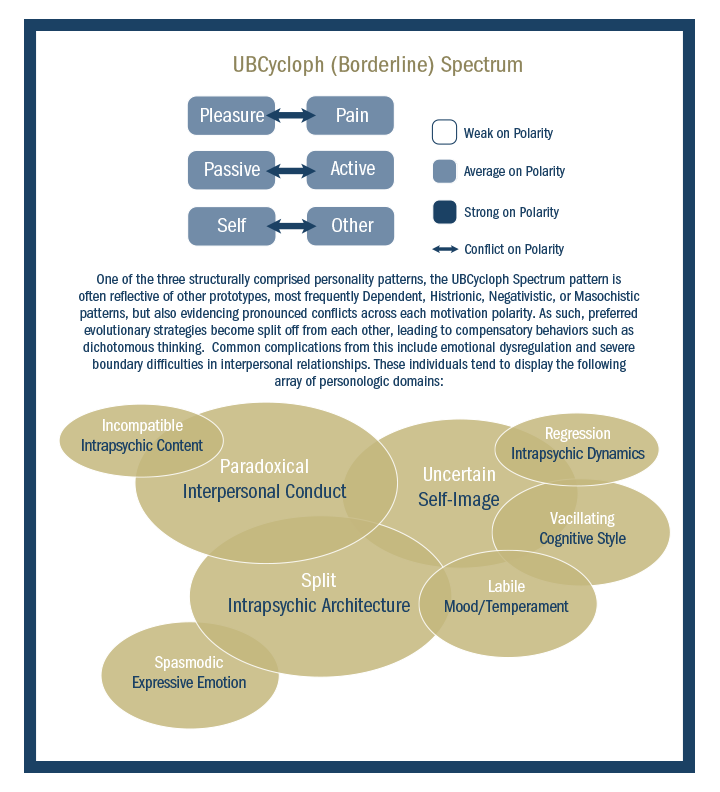 nine0003
nine0003
How I treated depression and anxiety for several years
I first saw a doctor almost eight years ago. I had an eating disorder - it often accompanies BPD, but I didn't know about it yet.
My gastroenterologist at some point realized that my constant pains in the abdomen were most likely connected not with physical problems, but with mental ones. My mother took me to a government clinic, where I came across incompetent doctors.
/eating-disorders/
How to cure eating disorders
The psychiatrist said that I have anorexia, I look terrible and I won't be able to find a partner because "men don't throw bones." Then I realized that it was not worth waiting for help from him.
I dealt with eating disorders myself, having gone through all the stages from anorexia to bulimia and compulsive overeating in two years. After solving the problem with food, depression came. Here, I couldn't manage on my own.
My days were similar to each other: constant fatigue, apathy, I didn’t even have enough strength to eat and brush my teeth, and there was only fog in my head and no thoughts. My circle of contacts narrowed greatly, because those around me saw only aggression or received no answers at all. So several years passed, then I realized that I needed help. nine0003
My circle of contacts narrowed greatly, because those around me saw only aggression or received no answers at all. So several years passed, then I realized that I needed help. nine0003
On the Profi-ru website, I found a psychologist who lived next to me. Then I did not yet know how psychiatrists differ from psychologists and psychotherapists, so I did not receive the necessary help.
/psychotherapy-search/
How to choose a psychotherapist
Psychologists usually do not work with mental disorders, besides, in the sessions I just told what was bothering me, there was no other support. Sometimes I couldn't find words and we just kept silent.
I went to the specialist for about a month and paid 1300 R for each meeting. In total, we held nine meetings. The only thing I got was the fog left my head. Despite my condition and the fact that the psychologist could not do anything about it, she persuaded me to stay in therapy. She said that it helps, although I did not feel any relief.
11,700 R
I spent on a psychologist who did not help me
As a result, I did not want to spend more money on myself and lost confidence in doctors. Then I learned that in Moscow you can get free psychological help at the Moscow Service for Psychological Assistance to the Population. nine0003
Moscow Service for Psychological Assistance to the Population
I had to wait there for an appointment, but I had nowhere to hurry. About six months later, I was able to get to a psychologist. I told her what worries me - at that time they were symptoms of depression and apathy. She immediately said that I should talk to a psychotherapist, and I made an appointment with another specialist in the same clinic.
The psychotherapist referred me to a psychiatrist, suggesting several doctors she trusts. She said that I most likely had depression and needed medication. Psychiatrists are not accepted at MSPPN, so I went to a private clinic, where I had to pay 4000 R for an appointment.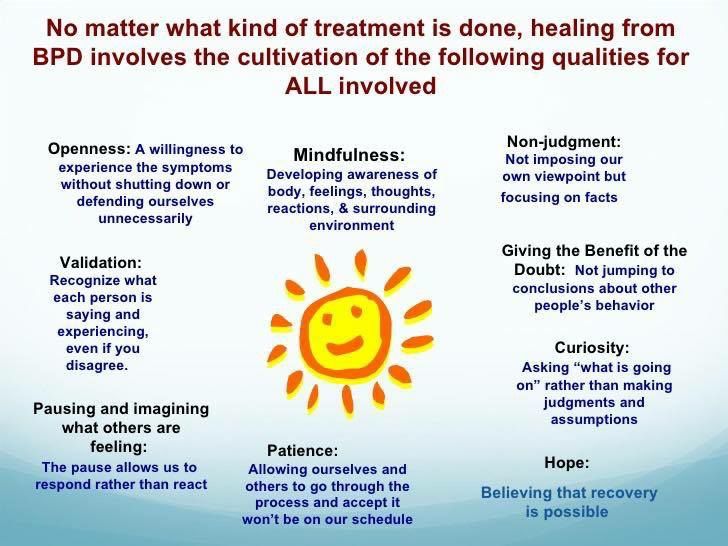
A psychiatrist at a private clinic diagnosed me with depression, prescribed an antidepressant and a tranquilizer. I was lucky that my doctor saw not only in a private clinic, but also in a state one, so I went to all subsequent appointments for free.
The second time I managed to find the right medicines. We fixed the changes not only with the help of conversations. The psychiatric clinic had a simulator on a computer, where the patient was asked to pass several tests: attentiveness, reaction speed, the ability to distinguish faces, and much more. I took tests at intervals of about once a month. nine0003
This testing is not necessarily and does not always reflect the effectiveness of the treatment, but I liked that the results got better every time. At that time, about 1,500 R per month was spent on medicines.
/list/antidepressant-myths/
8 myths about antidepressants
During the same period, I tried cognitive behavioral therapy.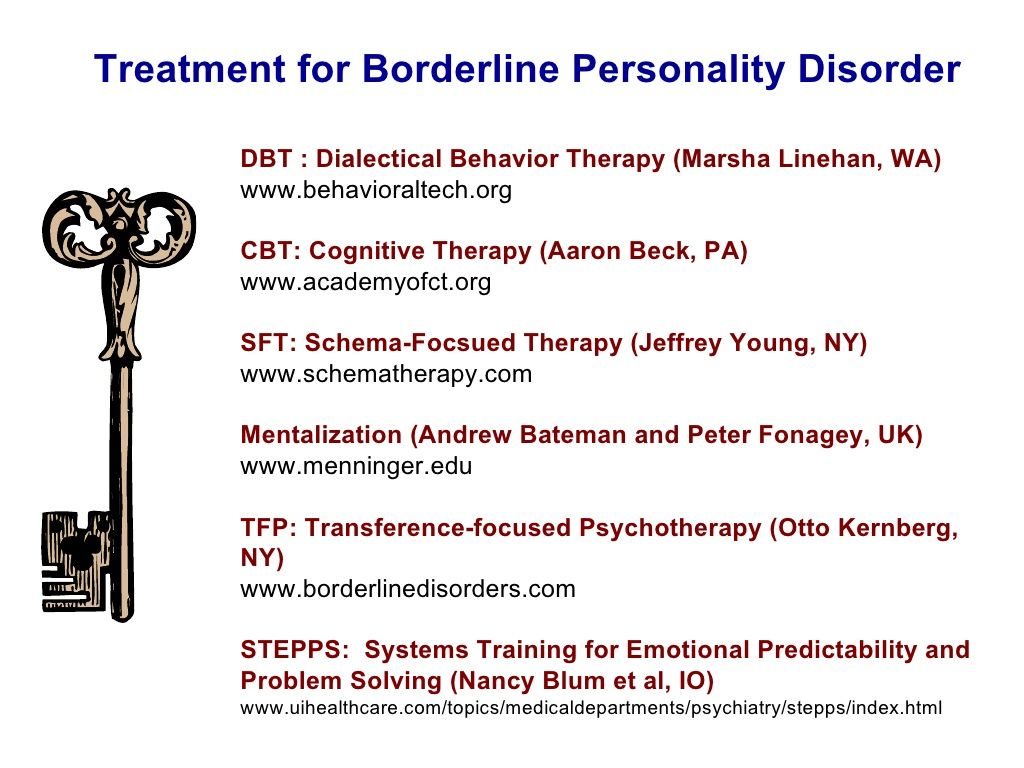 In a year I started and quit three times, nothing worked out for me. The mood diary was empty, because I do not distinguish between emotions, the diary of situations that concern me and their analysis, too. I did not understand why this or that situation became important to me. In total, I had five meetings with a psychotherapist, the cost of one was 3000 R.
In a year I started and quit three times, nothing worked out for me. The mood diary was empty, because I do not distinguish between emotions, the diary of situations that concern me and their analysis, too. I did not understand why this or that situation became important to me. In total, I had five meetings with a psychotherapist, the cost of one was 3000 R.
At that time, the doctor and I did not yet know that I had more than just depression with panic attacks and anxiety, so we did not follow my emotions and feelings much, which is important in BPD.
At some point, I abruptly stopped taking the prescribed pills and coped with the withdrawal syndrome for another week. I refused the pills, because it seemed that I could manage without them, besides, they helped for a short time, then everything started all over again.
/panic attack/
How to cope with a panic attack: recommendations from a psychotherapist
A month or two after the withdrawal, I felt fine and even started to exercise.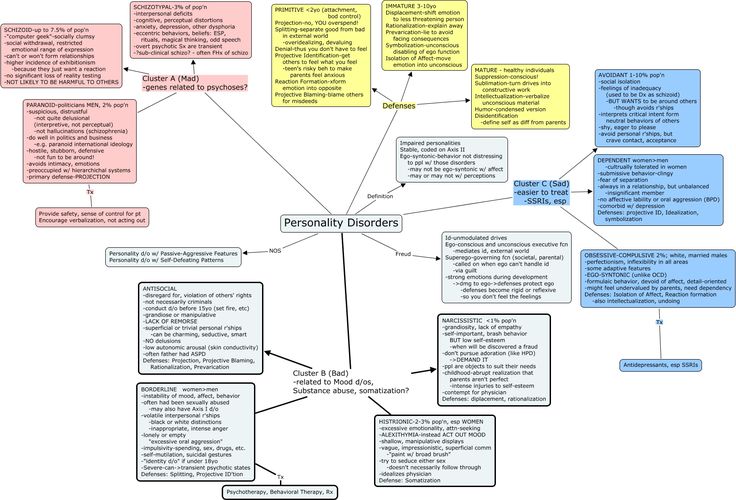 Then anxiety and depression symptoms returned, I suffered for a few more months and went to a new doctor.
Then anxiety and depression symptoms returned, I suffered for a few more months and went to a new doctor.
Over the next one and a half to two years, I changed three doctors in one private clinic, I was prescribed different types of medicines in different combinations and dosages. Primary appointments cost 4000-5000 R, repeated - 2400 R. I went to psychiatrists once a month to control my condition. I bought medicines either generics or original ones, they spent about 2000-3000 R per month. nine0003
The pills made me feel better for a short time, about a month. During this period, I was already diagnosed with "emotional personality disorder", but they did not tell me about it. I later found out from the medical record, which I requested before changing the clinic.
At the same time, I also turned to Gestalt therapy for help - this is one of the areas of psychotherapy aimed at developing self-awareness. For me, the sessions were an opportunity to cry, acknowledge problems, and receive support.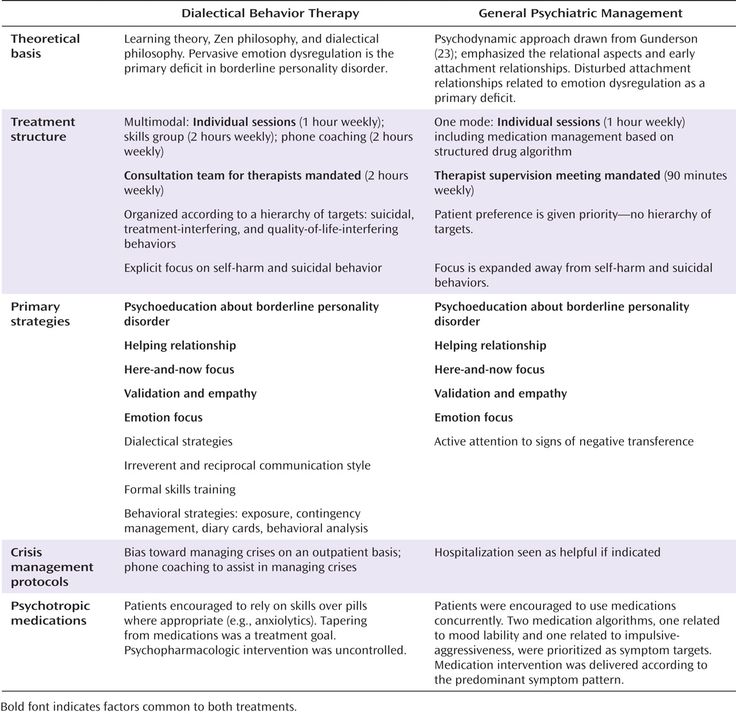 For three months, I called a psychologist every two weeks. One session cost 2000 R.
For three months, I called a psychologist every two weeks. One session cost 2000 R.
107,100 R
I spent on specialists before I was given the correct diagnosis
I spent on treatment before the correct diagnosis was made 177,100 R
| Expenses | |
|---|---|
| Medicines in the last two years of treatment | 55 000 R |
| Regular visits to psychiatrists | 50 400 R |
| Drugs in the first year of treatment | 15 000 R |
| Cognitive behavioral therapy, 5 sessions | 15 000 R |
| Three initial appointments with the following psychiatrists | 14 000 R |
| Gestalt therapy sessions, 6 sessions | 12 000 R |
| Psychologist sessions with "Profi-ru" | 11 700 Р |
| First psychiatrist appointment | 4000 R |
Medicines in the last two years of treatment
55 000 R
Regular visit to psychiatrists
50 400 R
Medicines in the first year of treatment
15 000 R
Cognitive-behavioral therapy, 5 sessions
15 000 P
Three initial appointments with the following psychiatrists
14,000 R
Gestalt therapy sessions, 6 sessions
12,000 R
Psychologist sessions with Profi-ru
R 11,7000002 Appointment of the first psychiatrist
4000 Р
How borderline personality disorder is diagnosed
Alexey Pribytkov
psychotherapist, psychiatrist, candidate of medical sciences
There are no specific studies in psychiatry that would help to make a diagnosis.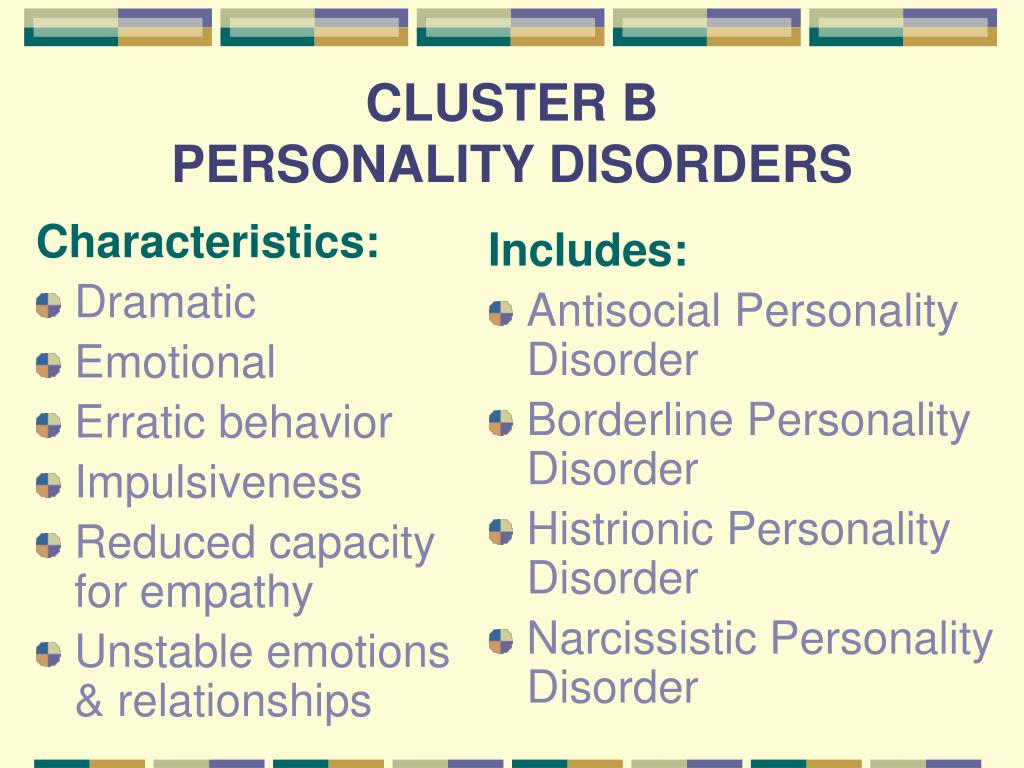 In the first place is always the clinical picture, that is, manifestations of mental disorders.
In the first place is always the clinical picture, that is, manifestations of mental disorders.
There is an interesting story with borderline personality disorder in Russia. We still use the International Classification of Diseases of the 10th revision, where in fact there is no such diagnosis, which means that for a long time it was out of sight of psychiatrists. But the absence of a diagnosis in the classification does not mean the absence of violations, because more than 30 years have passed since the adoption of the ICD-10 - it was adopted by WHO in 1990 - and the understanding of mental disorders during this period has noticeably changed.
Now many modern doctors are guided by other criteria when making a diagnosis. They are most clearly formulated in the American classification of psychiatric disorders DSM-5. Similar criteria are used in ICD-11, which is adopted by WHO and should come into force in Russia in 2024.
The nine criteria that are specific to BPD are listed above.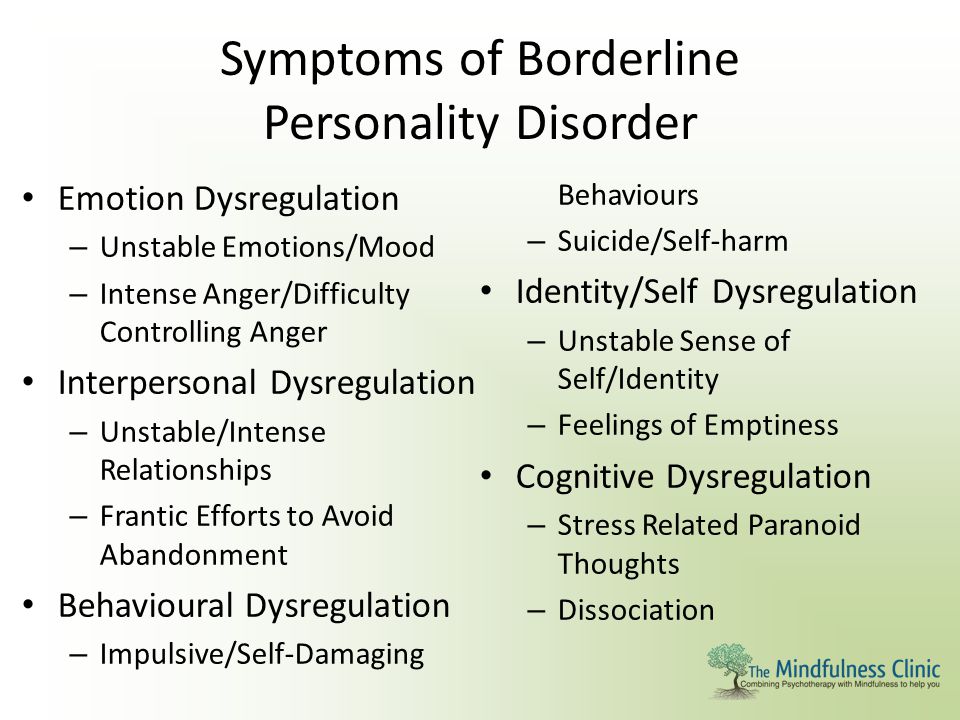 The task of the psychiatrist is to identify them during a conversation with the patient. The basis for the diagnosis of "borderline personality disorder" is the presence of at least five of the nine criteria. nine0003
The task of the psychiatrist is to identify them during a conversation with the patient. The basis for the diagnosis of "borderline personality disorder" is the presence of at least five of the nine criteria. nine0003
How I was correctly diagnosed and treated
After many unsuccessful attempts at treatment, I decided to change doctors again and went to a new psychiatrist at another clinic. The first appointment there cost 7,000 R, and repeated appointments cost 6,000 R.
The drug treatment was corrected for me. And with the final diagnosis, they rushed between bipolar affective disorder, or BAD, and borderline personality disorder.
/bipolarnoe-rasstroystvo/
How much does it cost to treat bipolar affective disorder
They are similar in symptoms. BAD also occurs with alternating periods of depression and high spirits, but they are usually long and can last several months.
In BPD, periods of different moods change over several hours, less often over several days, that is, the mood is constantly unstable.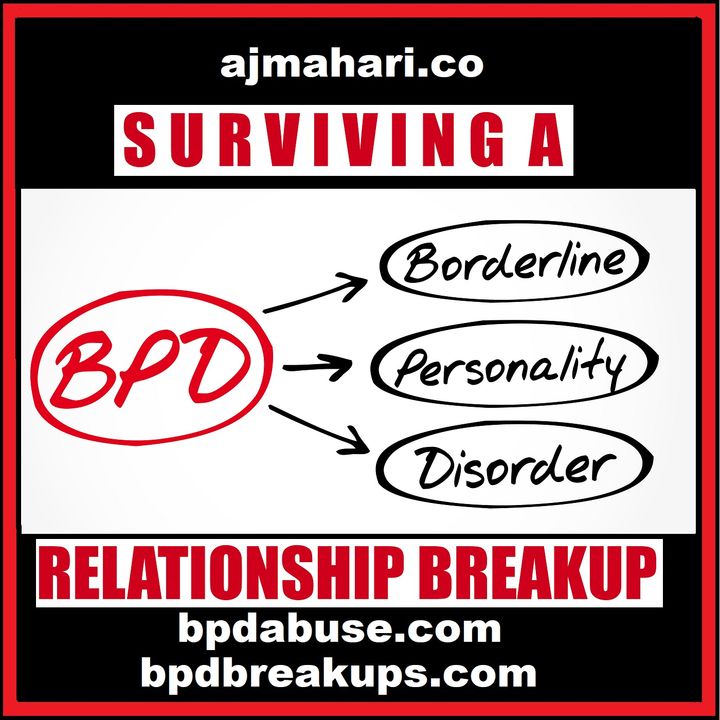 Moreover, these two disorders can occur simultaneously in one person.
Moreover, these two disorders can occur simultaneously in one person.
As a result, the psychiatrist diagnosed me with borderline personality disorder. Now, once every one and a half to two months, I go to him to monitor the condition. nine0003
Since that time, I began to go to schema therapy - this is a therapy focused on making a person change their behavior patterns. I go to a psychotherapist every week, one session costs 6000 R. I feel that it helps me.
BPD - MSD Handbook
My maladaptive patterns of behavior that my therapist and I identified at our first meeting. In the lower left corner are the schemes to be achieved It is difficult to treat BPD. My doctors never know in what condition I will come to them and whether I will come at all. Meetings are held online from time to time. I am often late, I call specialists from different places: it can be a park or my workplace, a stop on the street or someone else's apartment, a noisy highway or a food court.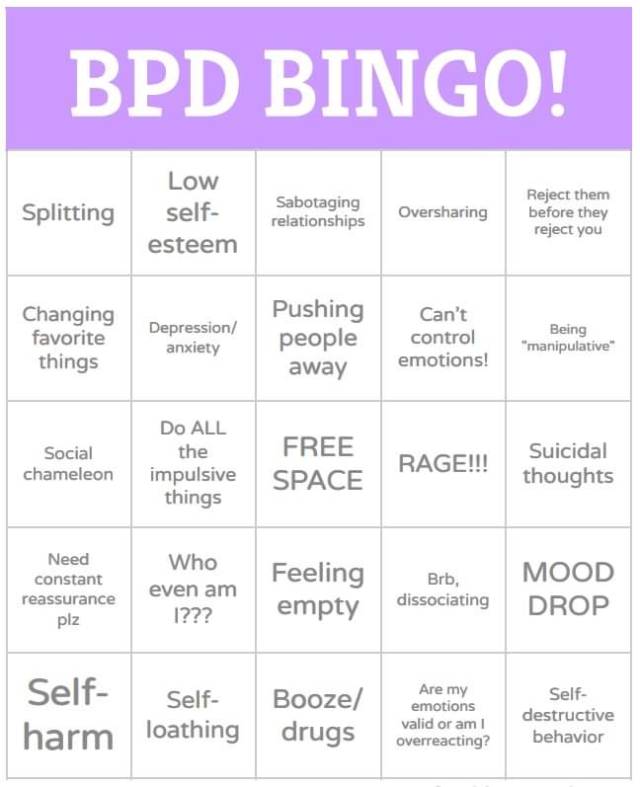 Sometimes I don't want to see my doctor because it seems that he is wrong about everything. nine0003
Sometimes I don't want to see my doctor because it seems that he is wrong about everything. nine0003
I used to feel disgusted and decided that I needed another doctor: I abruptly go from idealizing a person to hating him. For this reason, many doctors refuse patients with borderline disorder. In addition, people with BPD tend to discount their own problems, so many may not seek help for a long time.
/list/antidepressant-facts/
10 things to know before taking antidepressants
Over the years, I have developed several rules for choosing a doctor for myself:
- At the reception, they listen to me attentively.
- Everything that I consider important is important to a doctor. He should not wave his hand and say that there is no point in talking about something.
- The doctor speaks honestly about the diagnosis, does not hide anything, describes the treatment regimens.
- I am informed about the drug I will be taking.
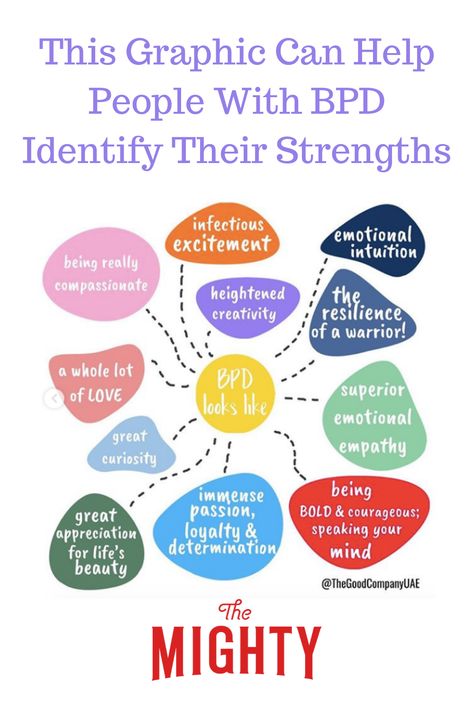 They explain exactly how it works, why it was prescribed, what side effects.
They explain exactly how it works, why it was prescribed, what side effects. - If I don't like something, I change doctors.
Unfortunately, there are no rules that help fight mood swings. I try to turn to the facts at such moments and tell the doctors how I feel. Psychiatrists, as a rule, treat the frequent change of doctor normally. I have never faced condemnation. nine0003 One of the latest treatment regimens My prescriptions for drugs, there are a lot of them due to different dosages
How borderline personality disorder is treated
Alexey Pribytkov
psychotherapist, psychiatrist, PhD in medicine
The main method of treating borderline personality disorder is psychotherapy. It is necessary to achieve a stable result. Medications only alleviate some of the symptoms of the disorder.
Dialectical Behavioral Therapy, or DBT, has the most evidence of effectiveness in treating BPD. Other directions can be applied: schema therapy, transference focused therapy - TFP.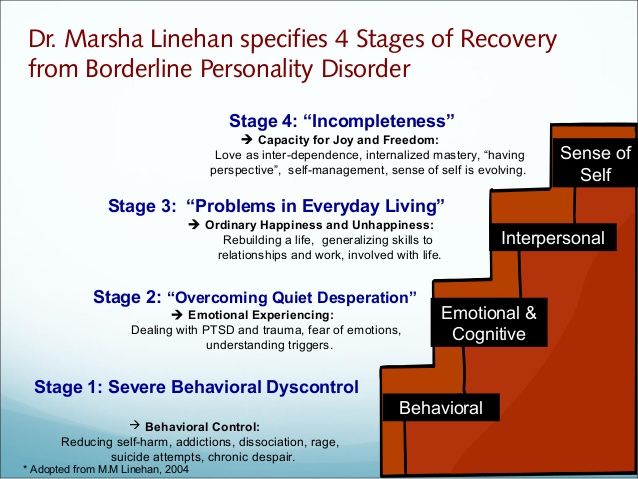 nine0003
nine0003
However, medications are also prescribed for most BPD patients. Three groups of drugs are usually used:
- Mood stabilizers, or mood stabilizers, are drugs that smooth out emotional fluctuations and help maintain an even mood.
- Antidepressants - they help reduce the severity of emotional instability. BPD often accompanies depressive and anxiety disorders, obsessive-compulsive disorder - antidepressants are also used to treat them. nine0060
- Antipsychotics, or second generation antipsychotics, are prescribed in low doses to correct impulsivity and aggression.
The choice of treatment regimen depends on the symptoms of the individual patient. Drug therapy usually lasts at least a year, more often several years.
How do I deal with borderline personality disorder
Insomnia. I have suffered from sleep problems since childhood. I tried everything: from hot milk at night to being very tired during the day.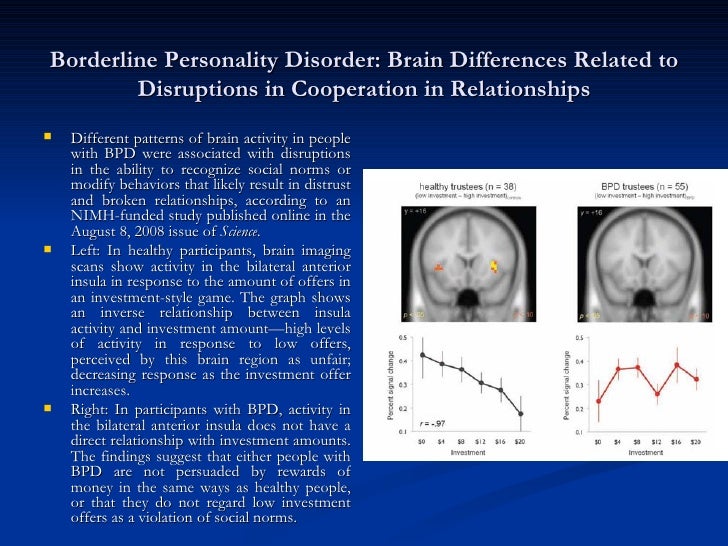 nine0003
nine0003
Unfortunately, I don't have a universal solution to this problem. I only save myself with pills: psychiatrists prescribed tranquilizers for sleep, now I have an antidepressant with a strong sedative effect - or I just don’t sleep.
/insomnia/
How to deal with insomnia
Anxiety and panic attacks. It often overtakes unexpectedly and at the most calm moments. Just talking to a friend, I can start twitching my leg, nervously breaking my nails, scratching my skin with my nails, or sticking to my phone. This is also manifested by a rapid heartbeat, trembling in the body, a desire to move, and strong fear. nine0003
To get rid of this feeling, I knit, switch to TV series, listen to meditation practices, start moving more, turn to metaphorical associative cards or Tarot. Metaphorical associative cards are cards with pictures that you can interpret based on your experience.
I use cards when my anxiety is about the future.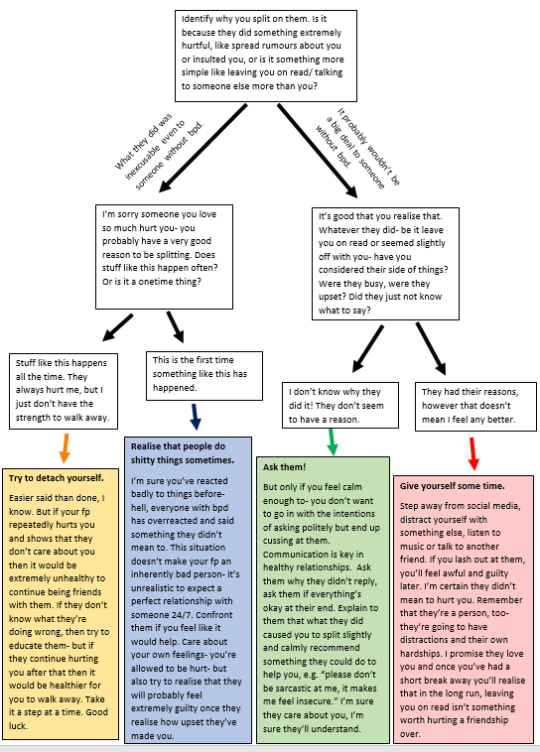 I am extremely afraid of uncertainty, and this is a chance to decide at least a little, albeit somewhat irrational.
I am extremely afraid of uncertainty, and this is a chance to decide at least a little, albeit somewhat irrational.
Feeling alone and abandoned. Feels like an unfilled hole in the chest. At such moments, I am sure that I have no one to turn to, no one will help. The feeling that I am alone in the whole world.
Saves background noise such as a movie or TV series. I also have three cats that periodically ask for attention, and I am no longer alone. During periods when I feel very lonely, my friends help, who, if they cannot come, then at least call or write.
Sometimes, in order to feel that I am not alone, I look for meetings with different men. I tend to dive into the person who gives me attention, as if I'm trying to close the inner "hole". If I don’t get enough attention, then I show aggression, and subsequently I change the “victim”. I'm trying to deal with this with the help of psychotherapy. nine0003
Mood swings, anger and aggression.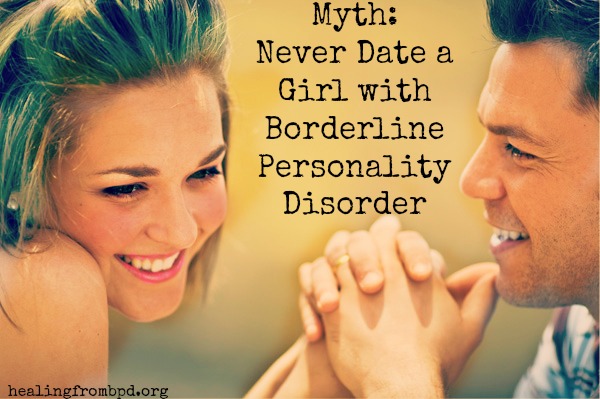 In an hour I can experience a huge range of emotions, it is very tiring. Moreover, anything can become a trigger: an incorrect statement on the part of the interlocutor, just an action that seemed wrong to me, or an opinion that is the opposite of mine. I can be aggressive even to banal questions about my well-being.
In an hour I can experience a huge range of emotions, it is very tiring. Moreover, anything can become a trigger: an incorrect statement on the part of the interlocutor, just an action that seemed wrong to me, or an opinion that is the opposite of mine. I can be aggressive even to banal questions about my well-being.
I try to warn people about the peculiarities of my behavior, I leave the dialogue if I feel that I am jumping into aggression, I try to distract myself. My psychotherapist advises to live through aggression and give it a way out: tear a sheet of paper, go in for sports, beat a pillow, shout. nine0003
/list/psychotherapevt/
10 important questions for psychotherapist Sergey Divisenko
Changes in interests, hobbies and desires. I don't have one hobby, they are constantly changing. I can't say what my favorite movie or music is. Because today I like one thing, and tomorrow I'm already interested in absolutely polar things.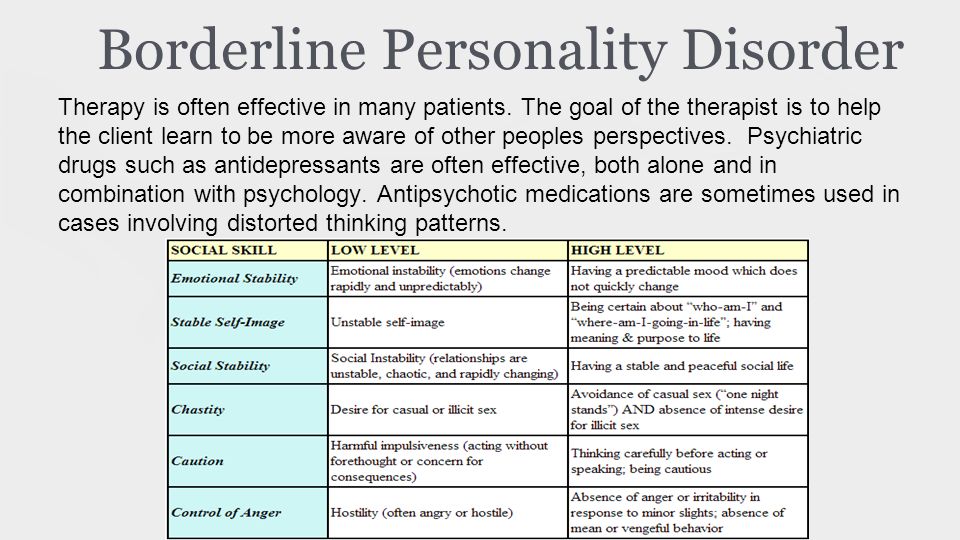 I never know in advance what awaits me the next day.
I never know in advance what awaits me the next day.
Suicidal thoughts and destructive behavior. For the first time I thought about suicide at the age of 14. Then these thoughts haunted me throughout my life. Somehow I lived with a gas leak in my apartment for several months, knowing full well about it. I drown my negative emotions in alcohol. I used to cut myself, but then I replaced this ritual with getting tattoos on my body. nine0003
Such thoughts are difficult to deal with. Medication, mindfulness and constant support from a psychotherapist help a little. I also sometimes go outside in the cold or take a shower: it's sobering.
Unstable self-esteem. I need a permanent evaluation from the outside. I doubt whether I am doing the right job, whether I look right if I do not receive feedback from people. Every mistake is a tragedy for me, but from praise I can feel capable of anything. I can spend weeks thinking that I did some wrong action, although it did not suffer consequences.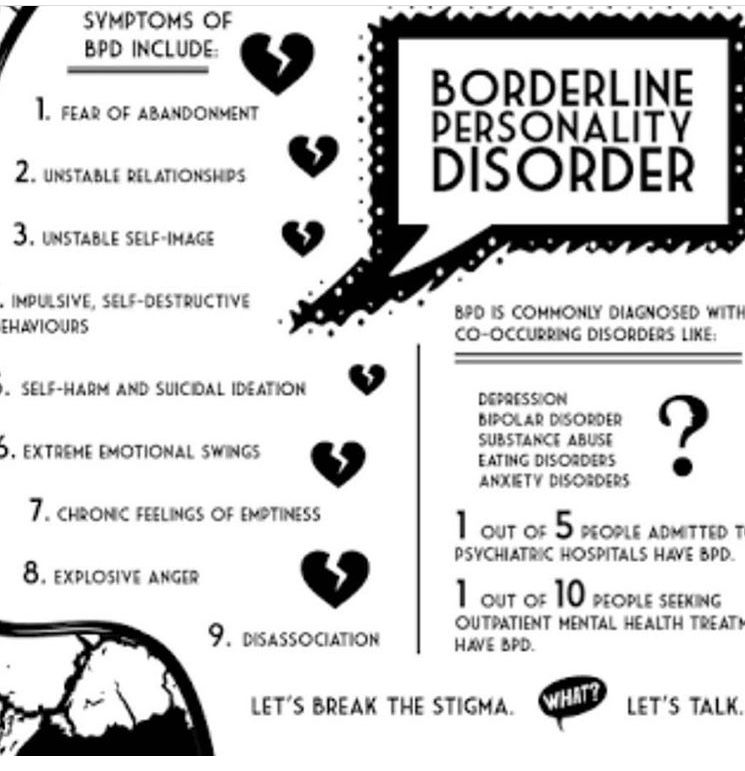 nine0003
nine0003
To cope with this, I try to compliment myself, remind myself what I'm doing and why, and look at the results of my work. This does not always work, but here you need to take small steps and learn to focus on your feelings, and not just on others.
11 types of psychotherapy that work
Communication difficulties. I'm thrown from love to hate. I often conflict and change because of this place of work. In no relationship have I lasted more than a few months, and communication with friends is reduced to a couple of meetings a year. If I feel that I may be rejected or denied something, then I do it first to avoid emotions. nine0003
Everything that happens is always a disaster: vivid emotions, strong feelings of guilt. If I feel like I'm getting less attention, I'm hysterical. I immediately feel abandoned and abandoned. Considering my peculiarities of behavior, I always try to warn friends and relatives about my condition and tell how not to run into even more negativity.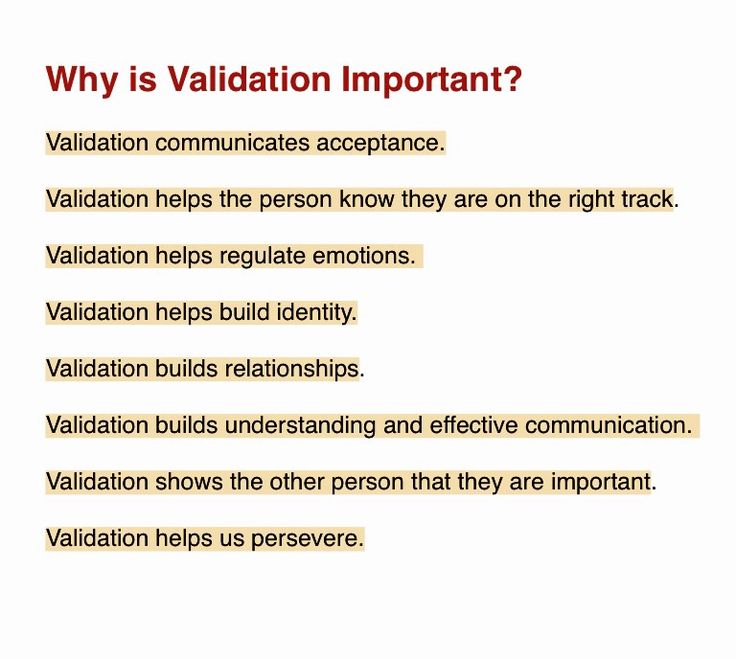
How to better communicate with people who have borderline disorder
As with many people with BPD, the SET-UP method works well for me. There is about him in the book “I hate you, just don’t leave me. Borderline Personalities and How to Understand Them by Kreisman and Strauss. nine0003
6 useful services for finding a psychotherapist
SET stands for support, empathy, truth - support, sympathy, truth.
It is important that none of the parts can be thrown out of this communication triangle, otherwise the person with BPD will go into conflict or stop communication altogether:
- Support should be expressed in the form of concern in the first person: “I worry about how you are you feel." The main thing is to express your own feelings and sensations. nine0060
- Sympathy: "You must be feeling upset." It is important to validate the feelings of the person with BPD. Don't try to show pity or talk about how you feel the same way.
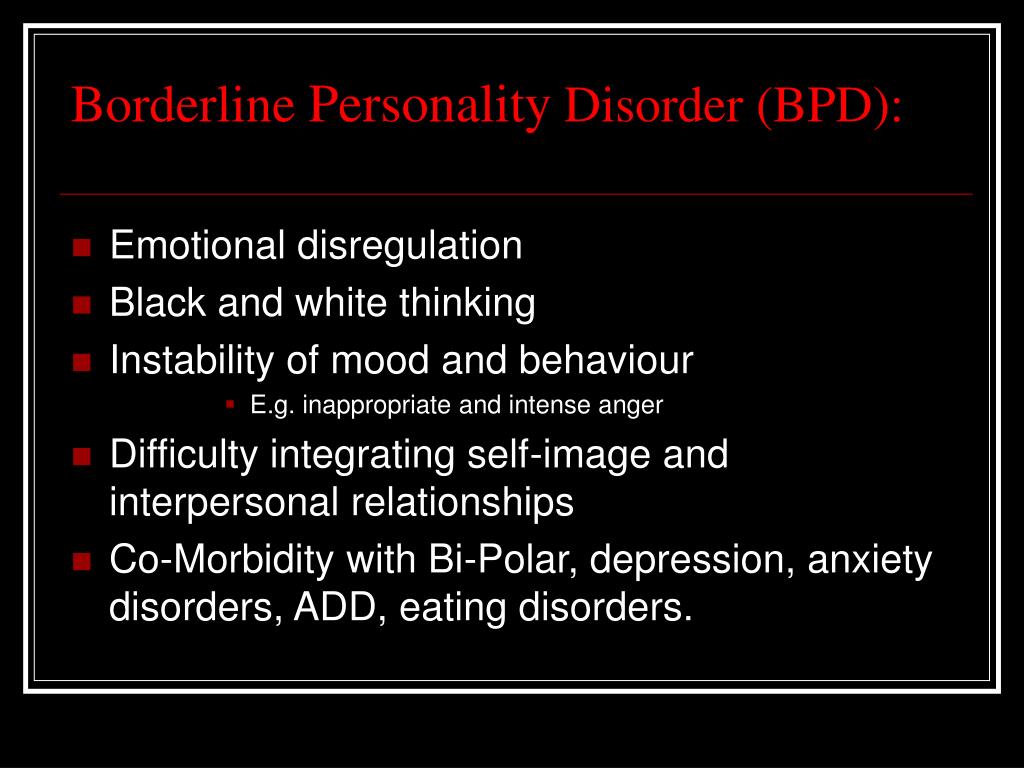 Most likely, this is not the case. And the phrase "I know how bad you feel" will only cause ridicule and anger.
Most likely, this is not the case. And the phrase "I know how bad you feel" will only cause ridicule and anger. - Truth: you need to rely on the facts about the situation and not go into accusations. For example: “You quit, you have enough money for a couple of months. I can help by preparing your resume, and you will look for a new job.” nine0060
UP is understanding, perseverance, or understanding and perseverance. These are goals that both participants must achieve.
A person with BPD must become aware of the causes of his actions and their consequences. Understand that he influences his life and can change it. He needs perseverance in order not to give up treatment, because any changes are difficult.
For those close to a person with BPD, understanding is the recognition of a person's feelings and emotions. That is, the acceptance that negative statements and aggression are behavioral features. They need perseverance in order to continue communicating with a person with borderline disorder, not to stop reminding him of his readiness to help, to sober him up and help him find the true cause of events, rely on facts, and not let him focus only on emotions.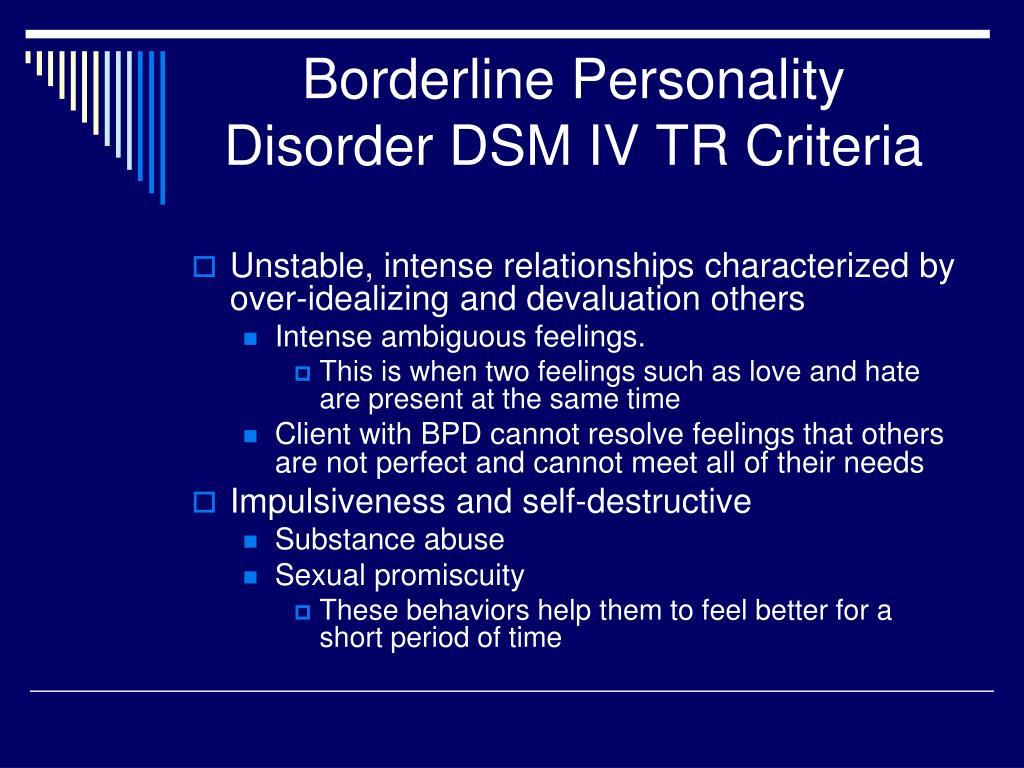 nine0003
nine0003
/shizofreniya/
How much does it cost to support a relative with a mental disorder
Communication with a person with BPD is always stressful, so people around need to take more care of themselves. It will take a lot of patience and strength to withstand sudden mood swings and maintain relationships.
The main thing is to understand that it is not your fault and you cannot influence BPD. However, if you remain in a stable state and support a person with a disorder, he will eventually cease to see his relatives as a potential threat, which means that there will be fewer outbreaks of aggression. nine0003
There is a resource center "Borderline Personality Disorder" in Russia. It is designed for Muscovites, but on the site you can find personal stories of people with BPD, literature on the topic and features of this disorder.
How much does it cost to treat borderline personality disorder? The psychotherapist told me that we would manage in a year.
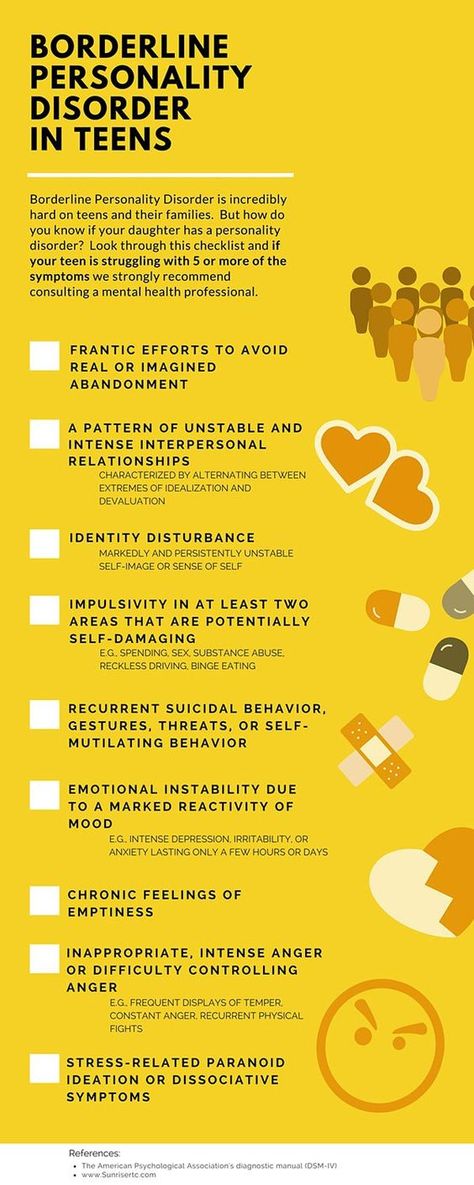
I need to visit a psychotherapist every week, an appointment costs 6,000 R. In addition, every one and a half to two months I visit a psychiatrist, whose appointment also costs 6,000 R.
/prl/
How much does borderline personality disorder treatment cost? Since I have severe depressive episodes, I need to take pills for a long time: from the moment my condition becomes stable on the background of psychotherapy, it is another 6-12 months.
Now about 2000 R per month is spent on drugs. I often change pills, so the cost is approximate. nine0003
Drug treatment can remove symptoms that interfere with a normal life, and with the help of a course of psychotherapy, it will be possible to go into remission and significantly improve the quality of life. Relapses are extremely rare and are associated with affective states.
I spend 372,000 R per year for the treatment of borderline disorder
| Treatment | Expenses |
|---|---|
| Weekly psychotherapist visit | 312 000 R |
| Psychiatric visit every 2 months | 36 000 R |
| Medicines | 24 000 R |
Visiting a psychotherapist every week
312 000 R
Visit a psychiatrist once every 2 months
36 000 000 000 000 2 24 000 24 000 R
Is it possible to cure a border personality disorder
Aleksey Profitkov
0003
psychotherapist, psychiatrist, MD
We cannot completely eliminate the symptoms of borderline personality disorder.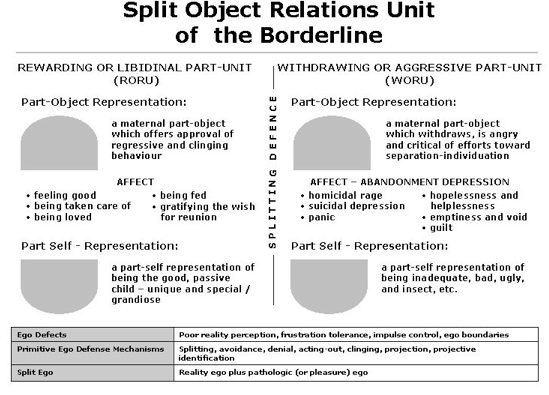 However, its manifestations can be smoothed out: pronounced negative traits can be corrected, some stability achieved, and social adaptation improved.
However, its manifestations can be smoothed out: pronounced negative traits can be corrected, some stability achieved, and social adaptation improved.
At the same time, the essence of personality cannot be changed, the characteristics of a person are preserved. In fact, the task of treatment is not to completely eliminate these features, but to teach a person to live with them, to clearly understand and manage them. nine0003
Remember
- Borderline personality disorder is characterized by unstable mood, fluctuations in self-esteem, dependency on the opinions of others, and an acute fear of being alone.
- The risk of developing BPD is increased by genetic factors, stress and violence in childhood, and poor attitude towards the child by significant adults.
- Borderline personality disorder is usually treated with psychotherapy, but medications may also be needed to relieve some of the symptoms and make life easier. nine0060
- It is difficult for close people to communicate with a person with BPD, you need a lot of patience to maintain a relationship.
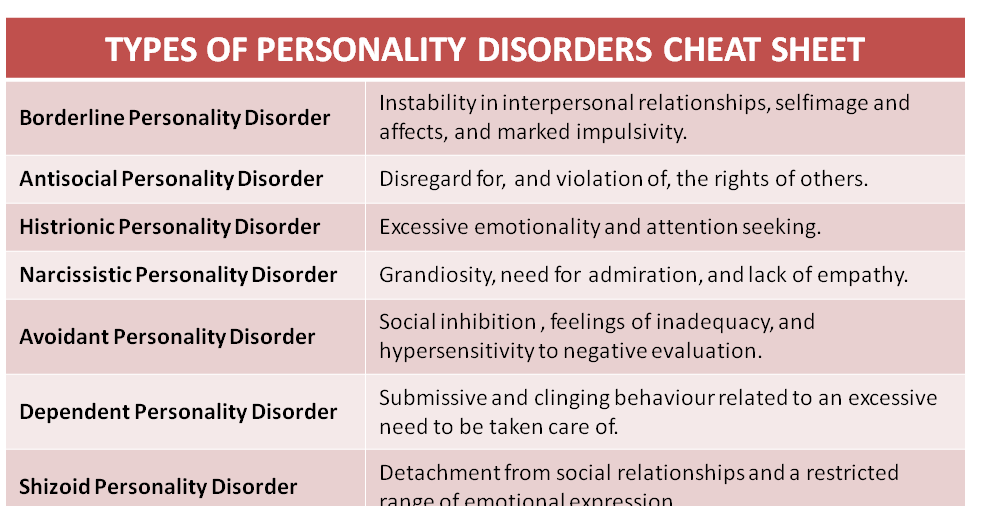
- With the help of a course of psychotherapy, it can be possible to go into remission and significantly improve the quality of life.
How to live with a "border guard" | PSYCHOLOGIES
22,441
A person among people
Life with a "border guard" is often compared to a "roller coaster" - ups and downs, good periods filled with love and happiness, then emotional outbursts, fits of rage or attempts at tight control . This causes confusion, helplessness, despair and the obvious question: “How to deal with this?” nine0003
Stop walking on eggshells!
Authors of Stop Walking on Eggshells. Living with someone with borderline personality disorder Paul Mason and Randy Kroeger answer this question and more. They created a kind of instruction, a guide for those who live with the "border guards".
Reminding that diagnosis is the task of doctors, psychiatrists, Paul Mason and Randy Kroeger provide useful information about this type of disorder, not fully understood by specialists.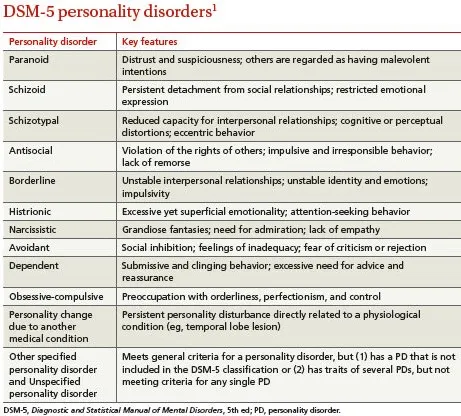 nine0003
nine0003
“The definition of a personality disorder implies that it causes suffering both for the person and those who interact with him. The description of BPD seems so negative that people with this diagnosis often feel stigmatized.
It is extremely important to remember that borderline personality disorder and its owner are not the same thing. If you live with a borderline person, it can be difficult to separate the diagnosis from them. In fact, only a person with BPD can control his thoughts, feelings and behavior. And this is important to understand for the recovery of SPs and for yourself.” nine0003
The following clearly structured chapters provide information about BPD itself and the inner world of a person with this disorder. The writing of the book was preceded by a long period of communication with the "border guards" and their relatives, the collection and systematization of information shared by real people.
That is why the "manual" covers such a wide range of problems - and each question is given a clear answer.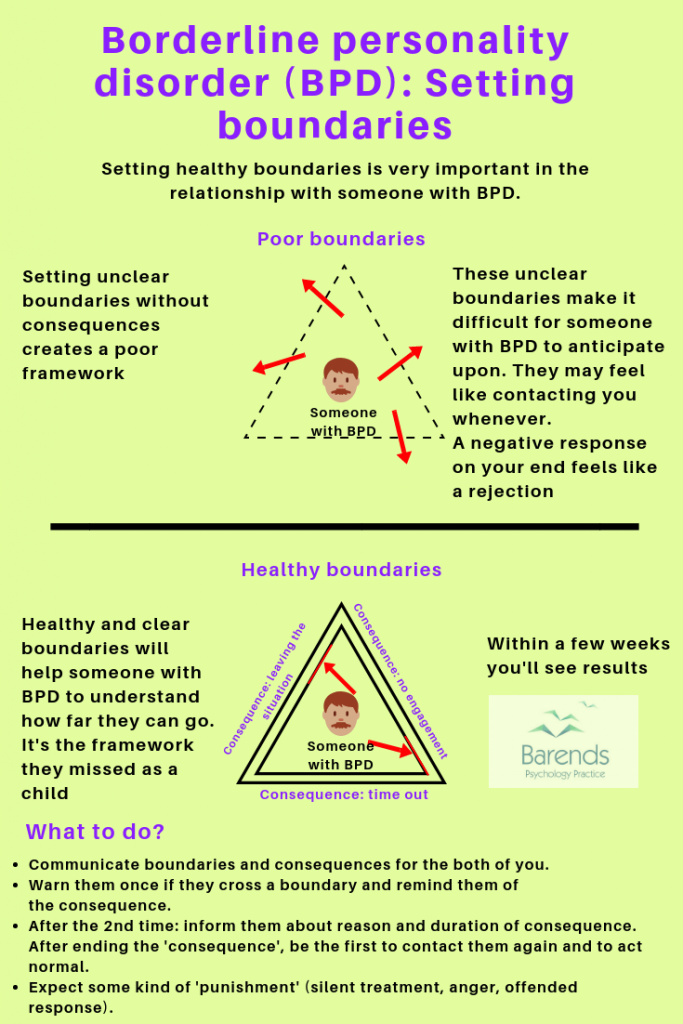 In addition, the reader has the opportunity to look at the described situations from different angles - through the eyes of the people with BPD themselves, their parents, children or partners and experts. nine0003
In addition, the reader has the opportunity to look at the described situations from different angles - through the eyes of the people with BPD themselves, their parents, children or partners and experts. nine0003
How to regain control over your own life if there is a "border guard" next to you? How to resolve many specific issues? How to be guided in the search for a psychotherapist, what other literature on the topic can be read? And what exercises will help to cope with their own experiences and maintain balance? All the answers are in the book by Paul Mason and Randy Kroeger.
Here is a fragment of the text of chapter 2 “The inner world of the “border guard”: the definition of BPD. PRL Criteria".
"Desperate attempts to avoid real and imagined situations in which they will be abandoned"
Imagine the horror you would feel if you were lost as a child in Times Square in New York. A second ago, mom was there, holding your hand - and suddenly she was carried away by the crowd. You look around, panicking, trying to find her.
You look around, panicking, trying to find her.
This is how people with BPD feel most of the time - isolated, anxious, terrified at the thought of being alone. Caring, supportive people are like friendly faces in a crowd.
But if one takes a careless step, which can be interpreted as a sign of an impending departure, the SPs will panic and react. For example, an explosion of rage or a plea "Just don't leave!". It doesn't take much to trigger this reaction: One borderline woman stopped her neighbor from leaving her apartment to take her clothes to the laundry. nine0003
The fear of abandonment can be so strong that it literally overwhelms an SP: when a man told his SP wife that he probably had a deadly disease, she lashed out at him for going to the doctor.
If your SPs experienced neglect as children or grew up in a highly dysfunctional environment, they may have learned to deal with fear by denying or suppressing it. They had plenty of opportunities to practice, so the original emotion might not be felt.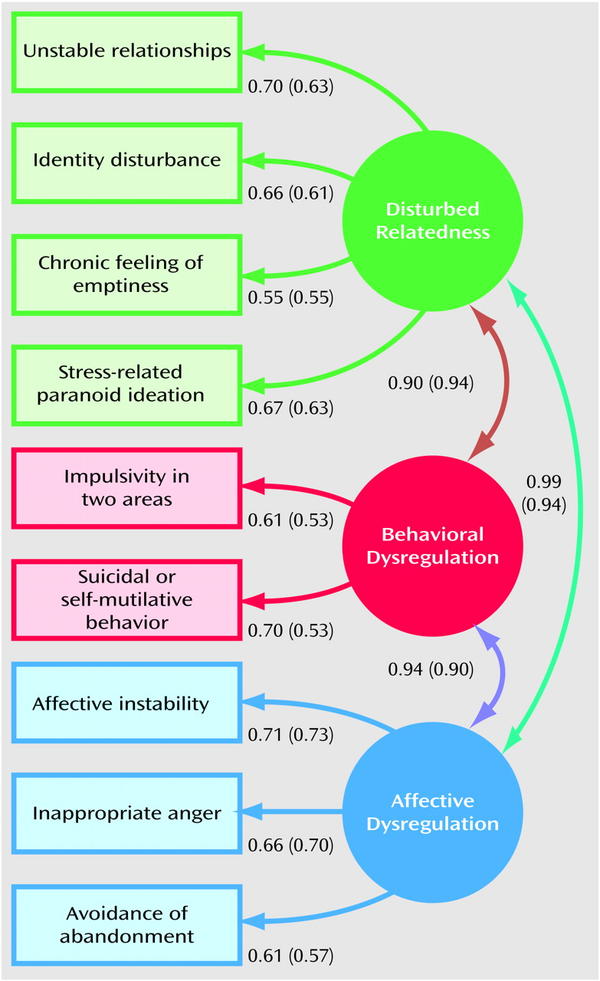 nine0003
nine0003
If SPs get upset or angry, try to remember if some circumstance could have triggered the fear of abandonment.
Armin (not borderline)
If I'm five minutes late on my way home from work, my wife will call me. She constantly sends messages to the pager. I can't go out with my friends anymore because she reacts so strongly to it. Messages on the pager came, even if we were going to the movies. It was so stressful that I stopped seeing my friends without her. nine0003
Sometimes people with BPD give immediate warning about their fear of being abandoned. However, no less often this fear is expressed in other forms, for example, through rage. Feeling vulnerable and out of control provokes anger.
Tess (borderline)
If I feel like I've been abandoned, a whole range of feelings arise: isolation, horror, loneliness. I panic. I think that I was betrayed, used. I think I will die. One day I called my young man, and he replied that he would call back later, as he is now watching TV.
